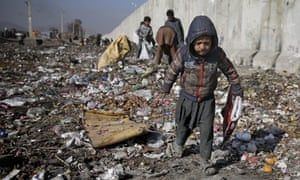Goal to eradicate poverty by 2030 ‘completely off track’, says
outgoing special rapporteur, with Covid-19 likely to impoverish millions
more
International institutions are losing the fight against global
poverty despite “self congratulatory” messages to the contrary,
according to the UN’s outgoing special rapporteur on extreme poverty and
human rights.
In his final report in the post, the Australian academic Philip Alston warns that states and global organisations are “completely off track” to meet the goal of eradicating extreme poverty by 2030, with more people instead likely to become highly impoverished by new shocks, including coronavirus and existing challenges like the climate crisis.
He told the Guardian he was sceptical about the role of the private sector in poverty reduction.
Blaming squandered opportunities, bad policies and hubris, Alston
said: “Even before Covid-19, we squandered a decade in the fight against
poverty, with misplaced triumphalism blocking the very reforms that
could have prevented the worst impacts of the pandemic.”In his final report in the post, the Australian academic Philip Alston warns that states and global organisations are “completely off track” to meet the goal of eradicating extreme poverty by 2030, with more people instead likely to become highly impoverished by new shocks, including coronavirus and existing challenges like the climate crisis.
He told the Guardian he was sceptical about the role of the private sector in poverty reduction.
Amid a round of international events in the coming weeks to examine the UN’s sustainable development goals (SDGs), Alston suggests the framework they provide for poverty eradication appeared more tailored for “colourful posters” and “bland reports”.

Alston is particularly scathing about reliance on one of the key metrics used internationally to measure extreme poverty – the World Bank’s so-called international poverty line of $1.90 (£1.52) a day as the measure of the amount per day below which people are said to be extremely impoverished.
He points to the fact that a large percentage of the world’s population live in high levels of precarity close to that limit, with nearly half living on below $5.50 a day, a figure that has barely changed in three decades.
“The result is a Pyrrhic victory, an undue sense of immense satisfaction, and dangerous complacency. Using more realistic measures, the extent of global poverty is vastly higher and the trends extremely discouraging,” Alston said.
“Even before the pandemic, 3.4 billion people, nearly half the world, lived on less than $5.50 a day. That number has barely declined since 1990.”
He also criticises the widespread insistence, driven in large part by the World Bank’s policies, on the private sector in poverty reduction, telling the Guardian there was little evidence that it is more efficient.
“The rush to fund the SDGs through ever-greater reliance on the private sector, whether through public-private partnerships or philanthropy, is a blind alley. Too many ‘win-win’ promises are fairy tales,” Alston said. “Instead multinational companies and investors draw guaranteed profits from public coffers, while poor communities are neglected and underserved.”
Given the state of affairs before the coronavirus pandemic, he is also deeply sceptical that there is any prospect for improvement.
“Covid-19 is projected to push hundreds of millions into unemployment and poverty, while increasing the number at risk of acute hunger by more than 250 million. But the international community’s abysmal record on tackling poverty, inequality and disregard for human life far precede this pandemic,” said Alston.
“Over the past decade, the UN, world leaders and pundits have promoted a self-congratulatory message of impending victory over poverty, but almost all of these accounts rely on the World Bank’s international poverty line, which is utterly unfit for the purpose of tracking such progress,” said Alston. The expert condemned the near universal reliance on the bank’s line, which he said is deeply flawed and yields a deceptively positive picture.”
Although the World Bank claims that the number of people in extreme poverty fell from 1.9 billion in 1990 to 736 million in 2015, says Alston, he adds that is “scandalously unambitious”, and evidence shows it doesn’t even cover the cost of food or housing in many countries.
The poverty decline it purports to show is due largely to rising incomes in a single country, China. And it obscures poverty among women and those often excluded from official surveys, such as migrant workers and refugees.
Speaking to the Guardian from New York, Alston expanded on his point about China, saying that while the country’s leaders did appear genuinely committed to poverty reduction – like other countries – that often amounted to a statistical exercise in pushing people over the World Bank’s $1.90 threshold.
“One of ‘miracle’ case studies always used is China. But I remember visiting China, and meeting with key people in charge of a taskforce eradicating extreme poverty, where it would be clear the discussion was how you could take [a] village or situation to get people the extra three cents a day [to get them over the threshold], not about how to improve their miserable situation. It was a statistical challenge.”
Remarking on his period in the past he added: “I think saddest things in the west is that support for poverty elimination has largely evaporated.”
Alston explained it largely in terms of the focus of political interest. “It was [senator] Bernie Sanders who said to me at one stage, look how many colleagues have rallies in very poor areas. They don’t see votes in them. And the overwhelming success of the ideological campaign that supports neoliberal policies is that it has succeeded in convincing people that those in poverty have no one to blame but themselves, while supporting the notion that trickle down policies will address it.”


No comments:
Post a Comment